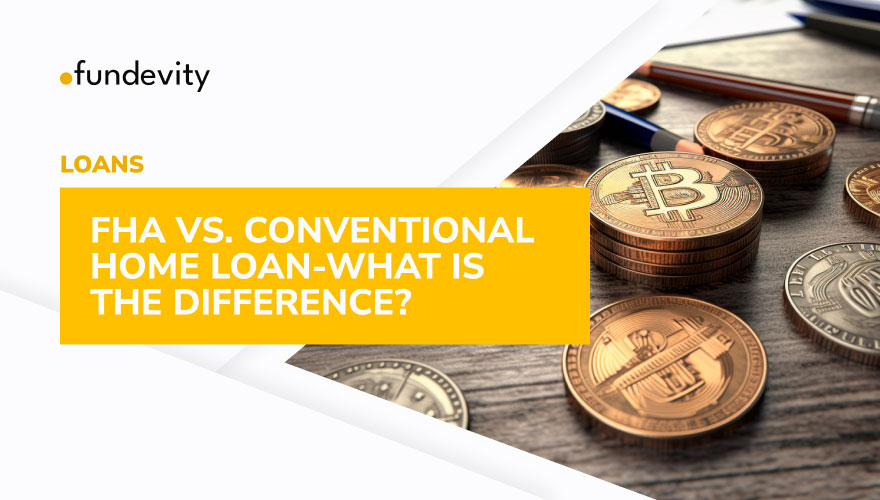FHA or Conventional Home Loan? – What Is the Difference?

There are a variety of loan kinds to consider when choosing a house loan. An FHA loan and a conventional loan are the prevalent ones. These loans works a bit diversely, and the qualifications for one against the other can differ.
Furthermore, these are just two of the several house mortgage choices accessible to purchasers. Your picks may differ according to whether you are a first-time purchaser, procuring a second home, or buying a vacation house.
As a result, when weighing the differences and similarities, keep in mind your specific home buying goals when deciding which loan is ideal for you.
What is an FHA Loan?
FHA loans are mortgages that are granted by the Federal Housing Administration. FHA loans are prevalent among first-time house purchasers with confined resources or credit difficulties because they demand only a 3.5% deposit for debtors with a credit rating of 580 and up.
The Federal Housing Administration covers mortgages made by banks, credit unions, and nonbank servicers. Since the insurance safeguards loan servicers if there is a failure to pay, FHA creditors are ready to offer debtors who would not be admissible alternatively for a house loan attractive conditions. An FHA-covered loan can only be granted by an FHA-authorized creditor.
FHA loan qualification rules make house ownership more attainable to a wider range of consumes. With an FHA loan, you may acquire up to 96.5 percent of the house’s worth as of 2021.
What is a Conventional Loan?
Private creditors insure conventional loans, which are not covered or provided by the government. To pass, you’ll need a greater credit rating, a low debt-to-income (DTI) ratio, and deposit.
Conventional loans are occasionally reffered as conforming loans since they reach the criterion of Fannie Mae and Freddie Mac. These are government-supported companies that purchase mortgages from creditors and either keep them or sell them as mortgage-backed securities.
Fixed and adjustable-rate conventional loans are attainable. The majority of conventional loans and other forms of mortgages have periods of 10 to 30 years.
FHA and Conventional Loan Comparison
There are a lot of factors to contemplate when choosing between an FHA loan and a conventional home loan. Both forms of loans have their own upsides and downsides, so it is important to weigh all of the factors before making a decision. Here are some of the prevalent and vital variables to think about:
| FHA Loan | Conventional Loan | |
|---|---|---|
| Deposit | 3.5% | 3% with additional benefits for making a greater deposit |
| Credit Rating | 580 | 620 |
| Mortgage Insurance | Demands both an annual fee and upfront fee | Only requires an annual fee |
| Loan Limit | $420,680 | $647,200 |
| Income Limit | None | None |
| Debt-to-Income Ratio | 50% | 43% |
| Interest Rates | Cheaper compared to conventional loans | Unless you possess excellent credit and a big deposit, you may pay greater interest rates than with an FHA loan. |
An FHA loan is a great choice for home purchasers who does not possess the best credit or who don’t possess a large deposit. The low deposit and versatile credit criterions make it simpler to enroll for an FHA loan. Additionally, the interest rates on an FHA loan are generally cheaper than those of a conventional mortgage.
When to Use a Conventional Loan?
Conventional loans are not only suitable for house purchases. Authorized debtors can utilize the loan to acquire a leade housing or a getaway house. Mortgage insurance is often demanded by creditors of conventional mortgages when debtors are unable to make a 20% initial payment, but if a debtor has paid off enough of the mortgage’s capital, premiums will be terminated.
A conventional loan demands a stellar credit rating and a bigger deposit, but it has fewer prohibitions. The funding necessities for conventional mortgages are traditionally rigorous because they are not granted by the public sector, such as a stellar credit rating and a low debt-to-income (DTI) ratio.
When to Use an FHA Loan?
Conventional loans demand a stellar credit rating and a greater deposit than FHA loans. FHA loans are developed for candidates with low to moderate incomes who will normally be unable to obtain a conventional loan. They are prevalent among first-time house purchasers because of these perks.
FHA loans impose stricter prohibitions than commercial loans, including cheaper deposits and credit ratings. FHA loans demand mortgage insurance, which is settled for 11 years or till the loan term ends, irrespective to the amount of equity in the house. You could be qualified for an FHA loan even with a 500 credit rating, but you could be asked to execute a greater initial payment than those with a stellar credit rating.
FHA loans impose another restriction: they should be solely utilized to buy a primary house.
FHA or Conventional Home Loan? Which One Is the Better Option?
Home purchasers who obtain conventional financing are seen as “safer” by certain sellers than debtors who are entitled for a FHA loan. That’s because FHA loans are sometimes viewed as a last choice for customers who can’t get a conventional loan. Regardless if this is real or not is a separate matter. In fact, notwithstanding the debtor qualifies for conventional credit, an FHA loan might create greater financial sense. Simply be mindful that perception exists.
Because FHA loans are supported by the public sector, they may impose different or more rigorous assessment and inspection standards. Some sellers may be put off by this because they don’t want to be left arguing about who will pay for needed house repairs before the deal closes.
So how do you decide between the two? It all depends on the circumstances. Every debtor is unique. Every financial position is unique. Every house is unique. Similarly, each loan has its own set of upsides.


